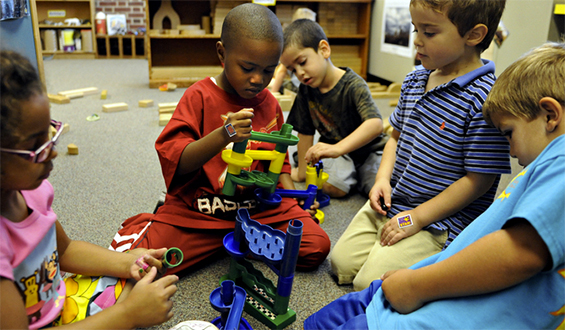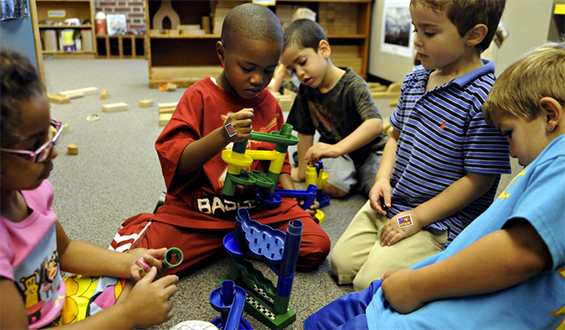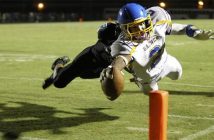
By Julia Steiny
Picture wriggly, shrieky, busy 5-year-olds exploring the kindergarten play yard’s treasures. The sandbox brims with budding builders, diggers, landscape designers. Some kids need mostly to run and scream. Others settle into swinging, climbing and kicking balls to each other. The luckiest kids have a bit a nature where they can make fairy houses for a community of imaginary beings living through dramatic, magical adventures. They learn the arts of taking turns, helping one another on projects and solving their own problems.
Maria Montessori said that “Play is the work of childhood.”
Picture a wise adult or two, standing at a distance, perhaps out of earshot, eyeing the elements of the kids’ evolving social world. The adults respond when asked to admire an accomplishment or play a role, but stay out of disputes unless it gets out of control. A new kid or loner needs adult help connecting to others. Grown-ups might redirect the aggressive impulses of a little bully and try to help her develop empathy by walking in her classmates’ shoes somehow.
But those were the kindergartens of yesteryear.
These days kids spend precious little time playing at all in school. Play and socializing might happen during short breaks between academic instruction, but many schools did away with recess altogether. Now kindergarten teachers teach first-grade skills and have no mandate to help 5-year-olds develop the social skills that will serve them for life. The Alliance for Childhood’s Crisis in the Kindergarten says, “Skepticism about the value of play is compounded by the widespread assumption that the earlier children begin to master the basic elements of reading, such as phonics and letter recognition, the more likely they are to succeed in school.” That assumption is wrong.
And recently yet more research shows how wrong the assumption is. In “Early Social-Emotional Functioning and Public Health: The Relationship Between Kindergarten Social Competence and Future Wellness,” Drs. Jones, Greenberg and Crowly examine the value of what they call the “non-cognitive” skills, or those skills not associated with IQ or achievement. They argue that these playing-nicely-in-the-sandbox skills actually support the “cognitive,” or academic, abilities of the child. The researchers mined the rich longitudinal data from the “Fast Track” study of low-income neighborhoods which collected teacher descriptions of a large sample of kindergartners starting in 1991 and then followed those kids’ outcomes 13 to 19 years later — until 2000.
Their studies reveal that when kindergarteners develop strong social skills, they have significantly higher odds of future success in a range of domains from physical health to academics. Little kids who cannot manage feelings or negotiate well with others are more likely, statistically, to become young adults who use drugs, struggle in school, get involved in the justice system, be unemployed, and so on.
“Kindergarten” means “child’s garden,” where kids grow organically.
Common Core, while marvelous in some ways, is only the most recent instrument of pushing academic instruction into kindergarten. In the 1990s, when computer-scored testing became cost-effective, states and their schools became obsessed with boosting their public image and value by increasing their scores. I’m all for testing as a way of checking on the equity and quality of certain academic efforts, but schools became all about testing, needlessly squeezing everything else out. Many early childhood experts are aghast about it. Losing supervised play as the best and most natural way for young kids to learn cripples curiosity. Developing self-control, cooperation and solving their own problems will produce the desired academic results, but only in good time.
Pre-literacy and play are not mutually exclusive.
By all means, steep kindergartners in rich literature and intriguing stories. Nourish the curiosity of those yearning to unlock the mysteries of reading. Build out their vocabularies at every opportunity. But mostly, let them love being at school — socializing, exploring. That will do far more to boost 3rd-grade reading than un-fun reading instruction.
Kindergarten teachers wouldn’t mind teaching social skills if they weren’t also saddled with the pain of pushing instruction that many argue is inappropriately premature. Harder, faster, younger isn’t working out. And oh what a turn-off it is for so many kids.
So restore play in kindergarten. Play is how children learn and how adults relax, recreate and restore well-being. It’s the ultimate restorative practice. In a world gone mad with aggression, you’d think we could agree that giving the kids a rich year of supervised play, learning empathy, would set them up with a higher quality of life.
Indeed, research strongly argues it will.
Julia Steiny: Restore Kindergarten to Boost Social Skills
0
Share.




